Shadow over the Balkans. Siege of Constantinople by the Turks in April-May 1453
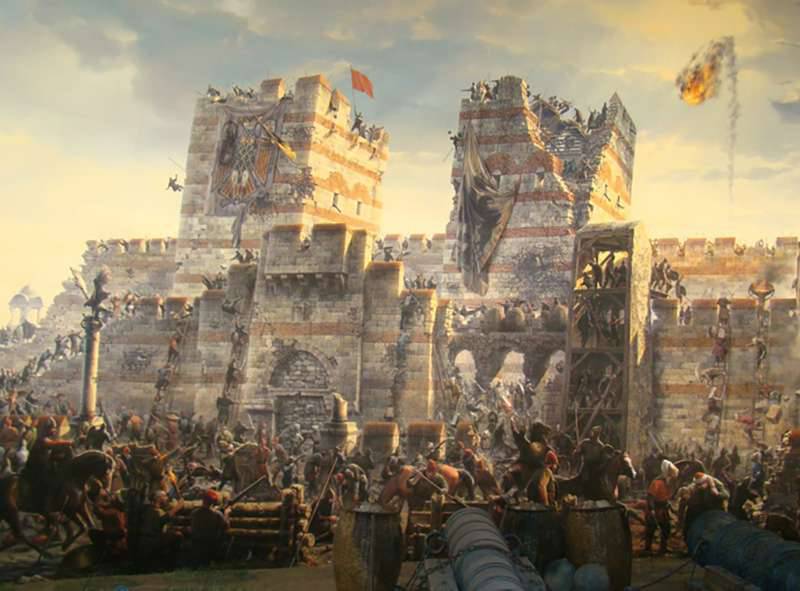
By the middle of the 15th century, the Byzantine Empire (or rather, what was left of it) looked like a relic of a long time sunk in the ancient world. A small shred of coasts on the coast of the Bosphorus, several small enclaves in the south of Greece in the Peloponnese - that's all that remained of the once huge state, whose possessions extended in three parts of the world. On the north coast of Asia Minor there was another state entity that formally related to Byzantium - the Trapezund Empire, formed after the seizure of Constantinople by the Crusaders in 1204. .
A new force has come from mountainous Asia Minor. At first, its presence was felt by the inhabitants of the Balkans, but soon an unpleasant chill swept across Europe. The state of the Seljuks under the leadership of Osman I, formed on the ruins of the Seljuk Sultanate, quickly began to absorb friends and enemies and, thanks to the gentle attitude towards the vanquished and religious tolerance, was spread out over most of Asia Minor. In 1352, the Ottomans first landed on the European coast of the Dardanelles. At first, the threat was not taken seriously - and in vain. Already in 1389, the Turks defeated a united Serb army on the Kosovo field. While Serbia was bleeding in Europe, people were arguing about eternal questions: “What to do?” And “Who will lead?”. The belated outcome of the debate was the battle of Nikopol 1396, in fact, the last major crusade. The “national team” of Europe (and many in general preferred the role of spectators) was utterly defeated. The Balkans simply fell into the hands of the Ottomans - Byzantium was reduced to a tiny size, the Bulgarian kingdom was fragmented. The closest neighbor, the Kingdom of Hungary, was only gathering strength to counter aggression.
Tarnished gold
The capture of Constantinople worried the rulers of the Muslim East since the period of the Arab conquests, that is, from the VIII century. The Turks called the capital of the Christian Empire “Kizil-elma”, “Red Apple”, referring to the value of this still substantial tidbit. Nineteen-year-old Sultan Mehmed II, a poet and a dreamer (in between military affairs), having established himself on the throne in 1451, decided to finally get rid of such an annoying neighbor as the Byzantine Empire in the person of its tiny fragments. The situation of the young Sultan, who recently took the helm of the state after the death of his father Murad, was very precarious, and to raise, as they say now, his political rating and his own prestige, a convincing victory was necessary. There was no better candidate than Constantinople, which was actually in the middle of the Ottoman possessions. In addition, the Turks were seriously worried that Venice or Genoa might use the convenient harbor as a parking lot or naval base for their fleet. Initially, the neighbors, and the Byzantine emperor, too, regarded Mehmed II as an inexperienced young man - this was their mistake. The “inexperienced” young man, who, incidentally (probably due to inexperience) ordered his younger brother Akhmet to be drowned in the pool, had very competent and warlike advisers - Zaganos Pasha and Shihab al-Din Pasha.
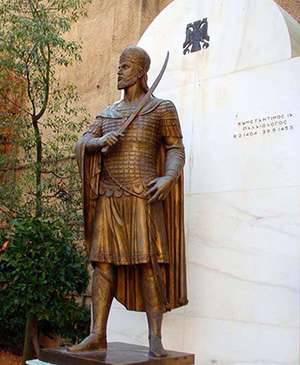
Emperor Constantine XI took rather rash diplomatic steps and began to seek concessions for Byzantium, hinting at the possibility of unleashing a civil war within the Ottoman state. The fact is that one of the claimants to the throne, the grandson of Sultan Bayazid I Orhan, lived in Constantinople as a political emigrant. Such maneuvers of tiny Byzantium infuriated the Turks and further strengthened Mehmed in his desire to seize the ancient city. The young sultan took into account the mistakes of his predecessors - the Turks did not besiege Constantinople for the first time. Last time, this attempt was carried out by his father Murad II in the summer of 1422. At that time, the Turkish army did not have enough fleet or powerful artillery. After an unsuccessful bloody assault, the siege was lifted. Now, the future campaign was taken seriously and thoroughly.
By order of Mehmed II, on the European coast of the Bosphorus, Ruseli-Hisar fortress was forcedly erected, which means “a knife at the throat”. To build this fortification, several thousand workers were driven. To speed up the process was widely used stone from nearby dismantled Greek monasteries. The construction of Rumeli-Hisar was completed in record time (no more than five months) by the spring of 1452. A garrison of 400 men under the command of Firuz Bey was stationed in a fortress armed with impressive bombards. His duties included the collection of duties from passing ships. Not all were ready for such changes - a large Venetian ship passing by the fortress refused to stop for inspection, after which it was immediately sunk by a large stone core. The team was beheaded, and the dull captain was impaled. Since then, unwilling to pay for the passage markedly diminished.
In addition to the newly built fortress, the newly appeared Turkish fleet appeared in the Bosphorus - initially in a small amount: 6 galleys, 18 haliots and 16 transports. But its increase, given the resources of the Ottomans, was only a matter of time. The emperor, quite clearly aware of the threat that Turkish preparations pose and which they are directed against, sent a delegation to Mehmed II with the appropriate gifts - to find out the intentions. Sultan did not accept them. The insistent Emperor sent ambassadors twice for “dialogue,” but in the end, angry either with Constantin’s obsession or his dullness, Mehmed ordered to simply decapitate the Byzantine “crisis management commission”. This was the actual declaration of war.
It cannot be said that in Constantinople they were idle. At the very beginning of the Turkish preparations, embassies were sent to the West with requests for help. By signing the Union of Florence in 1439 with the Catholic Church and acknowledging the dominance of the latter, Byzantium counted on the support of the Pope of Rome and other heads of state of Europe. This union itself, in fact subordinating Orthodoxy to the Holy See, was perceived by a part of the clergy and the public far from unequivocally. This alliance was adopted in the face of the ever increasing threat from the East in the hope that in the case of direct aggression against Byzantium "the West will help us." And such a moment has come. The Byzantine ambassadors poured doorsteps at the Pope’s residence, hoping to get some guarantees. Indeed, Pope Nicholas V appealed to the European monarchs to organize another crusade. But enthusiastic appeals were met without enthusiasm. Large and small kingdoms were absorbed in their own problems - no one showed a desire to fight because of "some Greeks." In addition, for a long time Orthodoxy was presented by the Roman Catholic ideology as a dangerous heresy, which also played a role. As a result, Konstantin XI, waiting in vain for help from the “Western partners,” found himself face to face with a large Ottoman state, which in military power exceeded tiny Byzantium by an order.
Sultan is preparing
All autumn 1452, the city of Mehmed held in continuous military preparations. To the then Turkish capital Edirne, troops were arrested throughout the country; weapons. While the practical component of the war was being created under the sound of blacksmith's hammers, the sultan paid tribute to the theory: he carefully studied various treatises on military art, manuscripts and drawings. The great Italian scientist and traveler Kyriaco Pizzicoli, or Kyriaco from Ancona, rendered him a great help in comprehending the difficult science. Another "military expert" who had rendered the Turks considerable assistance in the future siege of Constantinople was the Hungarian cannon master Urban. At first, he offered his services to Constantinople, but the reward that they promised there did not suit him. According to one version, the Emperor was stingy, but rather, the extremely impoverished Empire simply did not have the means. Mehmed inquired whether the master could make an instrument capable of piercing the walls of Constantinople, and received an affirmative answer. The first cannons produced by Urban were tested near the Sultan's palace and after successful tests they were sent into service with the Rumeli-Hisar fortress.
Preparations were made in Byzantium. Constantinople, although it was considered by inertia a Great City, but it was very outdated and lost its former gloss. On the eve of the imminent siege of the capital of Byzantium began the exodus of the population, and to its beginning in the once almost million city no more than 50 thousand inhabitants remained. By order of Constantine began the creation of food supplies, residents of nearby villages were resettled in the city. A special fund was created, where funds and donations flowed not only from the state, but also from private individuals and, of course, the church. Many churches and monasteries donated expensive jewelery for coin minting.
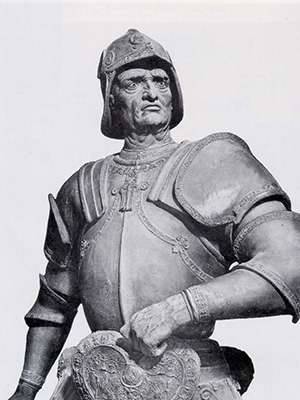
From a military point of view, everything was unfavorable. First, the walls of Constantinople, although they had an impressive appearance, but decayed and demanded repairs. The required number of soldiers was not there either - it remained to rely on mercenaries. Concerned about the sinking of their ship by the Turks, and most importantly, the threat of losing trade with the whole Black Sea, the Venetians sent small contingents of troops and equipment to Constantinople, and in the meantime began to prepare a military expedition to help the Greeks. Unfortunately, the Venetian squadron arrived in the Aegean Sea too late - the city had already fallen. Genoa, the eternal trade rival of the Republic of Venice, also took part in military preparations. In January, 1453, in the Golden Horn, arrived then condotier Giovanni Giustiniani Longo with a hired detachment of 700 people and large stocks of military property. Professionalism and knowledge of Longo were so high that Constantine appointed him commander of the land defense of the city. In the current situation, the Vatican also decided to take advantage of it. Taking advantage of the plight of the Greeks, Cardinal Isidore was sent to Byzantium with a proposal to go beyond the framework of the Union of Florence and merge the two churches into one. The squad archers brought with him from 200 were regarded as the vanguard of a huge army, and 12 December 1452 was served in the Hagia Sophia joint service with the Catholics. The population and part of the clergy reacted with doubt to such an idea, given the Vatican’s long-standing "benevolent" attitude to Orthodoxy and its apparent self-interest in a difficult situation. Unrest occurred in Constantinople. The promised help was not followed. As a result, to protect the walls with a total length of 26 km, at the disposal of Konstantin XI there were no more than 10 thousand people, of whom 3 thousand were foreign mercenaries. The naval forces besieged did not exceed the 26 ships, of which only the 10 were Greek. Once a huge Byzantine fleet became historyas the mighty empire itself.
By the beginning of 1453, Turkish preparations were proceeding at a high rate. Mehmed II himself planned to seize Constantinople in a short time, until in Europe they came to their senses and moved from “letters of support” to something more substantial. For this purpose, there was not only a large and rapidly forming land army, but also a fleet. In addition, great hopes were pinned on the activities of the "field design bureau" under the leadership of Urbana. True, the sultan wanted to seize the city in a relatively solid state and with a more or less preserved living population as future subjects. The plans of the defending side were reduced to a maximum tightening of the siege in the hope that the Turks did not have enough resources and patience, but most importantly, great hopes were pinned on the help of Europe. As it turned out, these were vain hopes - only Venice set up a fleet with an airborne detachment that came too late. Genoa, despite the Longo initiative, formally remained neutral. The nearest ground force in the face of the Kingdom of Hungary and the regent Janos Hunyadi demanded that the Greeks make territorial concessions and was in no hurry to fight. The vassal of the Turks, the ruler of Serbia, George, in general, deployed auxiliary contingents for the Turkish army. Back in the fall of 1452, the Turks invaded the Peloponnese and took control of the local Byzantine enclaves, ruled by the brothers Emperor Thomas and Demetrios. Constantinople was actually isolated - there was only the sea for communication with it.
At the end of winter, 1453, Mehmed II, arrived from Greece in Edirne, where the formation of the army was completed. According to various estimates, it numbered from 100 to 120 to thousands of people, including the Janissary Corps, regular and irregular units, as well as contingents from vassal states. Great attention was paid to the transportation of artillery, first of all, the products of the master Urban. To prepare for the transportation of the huge bombarders, a special engineering team was created from 50 carpenters and 200 excavators who were engaged in the arrangement of the road. The main bombardment of Urbana was dragged by a team of 60 oxen, who were assisted by 400 people.
Already in February 1453, the advanced Turkish troops began to occupy one after the other Greek cities on the coast of the Marmara and Black Seas. Those who surrendered without resistance were saved lives and even property. By such methods, the Turks stimulated the local population to change citizenship. Resisting blocked and left for later. The Turkish fleet, totaling more than 100 ships, mainly rowing, concentrated in Gallipoli, and in March moved to the nearest approaches to Constantinople, electing the Bay of Two Columns north of Galata as the forward base. The Greeks did not yet fear the Turkish ships, since the entrance to the Golden Horn Bay was securely closed by a massive metal chain. In March, in the area of the Rumeli-Hisar fortress, the ferry of the main forces of the Turkish army began: first, cavalry and Janissaries, followed by infantry and carts. Everything that was possible for the defense of the city was already done. During the winter, the old fortifications were repaired, and they created detailed lists of those capable of holding weapons; however, when this information was brought to the emperor, he ordered them to be kept in strict confidence, because the numbers were depressingly small. The forces of the defenders were distributed in the most threatening areas, primarily in the areas of the gate. The less dangerous were limited to pickets and sentries. The smallest protection put up from the Golden Horn, so far completely controlled by the Greeks and allies. The central area of defense with a detachment of 2 thousand mercenaries and Greeks headed Giustiniani Longo. There was an operational reserve of a thousand warriors. Constantinople had a large number of cold arms, but there were few guns.
On the walls!
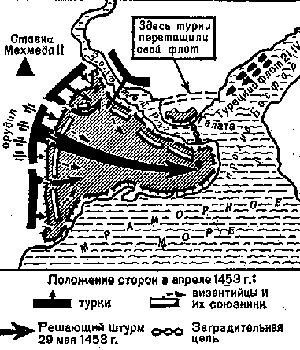
23 March Mehmed II arrived with the main forces under the walls of Constantinople and camped about 4 km from the city. Artillery was concentrated in 14 batteries along the city wall. In the afternoon of April 2, the Greeks finally blocked the Golden Horn chain, and on April X, Turkish troops began direct siege work no more than 6 km from Constantinople. The Rumelian (that is, the troops recruited in the Balkans) constituted the left flank of the line, the Anatolian - the right. In the center, on the hill Maltepe, located the rate of the Sultan. Part of the elite units was in reserve in the camp. Christian sources, clearly exaggerating, claimed that no less than 1,5 thousand had gathered under the walls of Constantinople at the walls of Constantinople, although more realistic figures point to 200 thousand soldiers and a large number of workers who were besieged were obviously perceived as soldiers.
According to one version, before the start of a full-scale siege, parliamentarians were sent to Konstantin XI with a proposal to surrender in exchange for preserving the lives and property of citizens. The head of state himself had to leave his capital, and in this he would not be obstructed. Konstantin said that he agreed to the indemnity and the loss of any of his few territories, but he refused to surrender the city. April 6 Turkish batteries opened fire on the positions of the Greeks. On April 7, the Turks launched an attack on the advanced fortifications of the Byzantines, using mostly auxiliary infantry. The attackers captured several forts brought forward. Captured prisoners there were demonstratively executed in front of the besieged. The insufficient number of guns in the Greeks did not allow them to conduct an effective counter-battery struggle and concentrate on the destruction of the infantry. With this task, the serf artillery, headed by the Bocciardi brothers, successfully coped throughout the siege. In the early days of the siege, the defenders made several fairly successful attacks, but soon Giustiniani Longo, finding that the losses in these actions exceeded the result, ordered that all efforts be focused on protecting the outer perimeter.
There was a pause in the siege - the Turks were shuffling their artillery batteries, transferring some of them to the most appropriate positions. April 11 Ottoman artillery resumed shelling, which now almost did not stop. At this time, the Hungarian ambassador arrived in the Turkish camp as an observer - “to sort out the situation”. According to the historians of the time, the Hungarian even helped the Turks with advice on how to arrange the instruments correctly. On average, guns made from 100 to 150 shots per day, consuming up to half a ton of gunpowder. On April 12, the Turkish fleet attempted to break into the Golden Horn, but was beaten off by an allied squadron. Higher-boring ships of the Greeks and Venetians allowed more effective fire. On the night of 17 on 18 on April, the Ottomans launched a local night attack in the Mesotheichon area, but after a four-hour battle, the besieged held their positions. The failed fleet Mehmed II sent to the capture of the Byzantine Prince Islands in the Sea of Marmara. All of them, one by one, came under the authority of the Sultan, only the largest of the archipelago, Prinkipos, resisted the invaders.
Meanwhile, Pope Nicholas V, whose admonitions did not bring significant results, rendered all possible assistance to Constantinople by sending out three chartered Genoese galleys loaded with weapons and various supplies. All the beginning of April, this detachment was waiting for a fair wind near the island of Chios. Finally, on April 15 he blew out, and the ships freely entered the Sea of Marmara. On the way they were joined by a Greek ship sailing from Sicily, loaded with grain. The 20 of April flotilla was already in sight of Constantinople. Mehemed II immediately ordered the fleet commander Admiral Baltoglu to go to sea and intercept the enemy. Because of the strong southern wind, the Turks had the opportunity to use only rowing ships, whose crews were reinforced by janissaries. To the sounds of pipes and drums, the Turks went on the attack, with an overwhelming numerical superiority. However, a sharp and long braid hit a sturdy stone. At long range, the Genoese and Greeks inflicted heavy damage to the enemy from the sides of their high ships, and then Baltoglu ordered to take galleys aboard. The main attack was aimed at a weakly armed Greek grain carrier. His crew, commanded by Captain Flatanelos, bravely beat off attack after attack, and, according to eyewitnesses, he used the famous "Greek fire". In the end, the four ships moored against each other, forming a monolithic floating fortification. By evening, the hushed wind blew again, and at dusk, to the exultant cries of the defenders of Constantinople, the flotilla entered the Golden Horn. Sultan was in a rage - Baltoglu was removed from all his posts and bits and whips. Execute an experienced military leader Mehmed did not dare.
While battles were boiling on the sea, and the whips unmercifully whipped back Baltoglu, the Turks decided to carry out a bold vision, which brought them an important tactical advantage and influenced the course of the company. It is not known for certain who prompted Mehmed to equip portage between the Bosphorus and the Golden Horn Bay: was the idea born among the Turkish command itself, or was it suggested by the numerous European “business people” around the Sultan's headquarters. In any case, the transportation of ships by portage was known in the East - in XII Salah ad-Din in this way transferred ships from the Nile to the Red Sea. On April 22, under the cover of shelling, the Turks began dragging their rowing boats along dragging into the Golden Horn. Around noon, an entire flotilla of Galiots was located next to the besieged city.
A secret meeting was immediately convened on a set of measures to prevent the threat. The only correct decision for the Venetians was the attack of enemy ships under the cover of darkness. They decided to hide the plan from the formally neutrality of the Genoese ships and postponed the attack until April 24, since the Venetians had to prepare their ships by protecting them with bales of cotton and wool. However, the Genoese were known to the 24 number about the idea and were offended by the fact that they want to deprive them of their fame. The attack was postponed until April 28, already involving the Genoese, but by that time only the deaf and dumb did not know about it in the city. When the flotilla of the allies finally attacked the Turks, who greatly added in quantity, because they did not experience a shortage of manpower, she was met by heavy gunfire from the Galiotov and coastal batteries. Part of the ships besieged was sunk, part was forced to go back. The next day, the Turks publicly executed all captured sailors. In response, the Greeks beheaded the Turks who were in their captivity. But now the Turkish fleet firmly entrenched in the Golden Horn. Part of it was located in the Bosphorus, and the besieged constantly had to keep their forces at the chain. 3 May a small Venetian brigantine with a crew of volunteers left Constantinople and went in search of the Venetian fleet, which allegedly should have been nearby. The news of the preparations of Venice brought with them burst ships.
In the meantime, the situation of the besieged was getting worse. Turkish engineers built a pontoon bridge across the Golden Horn, which allowed unimpeded transfer of troops and artillery from one bank to another. The bombardment continued - the refurbished giant bombardment, the “Basilica” of Urban, was again pushed into position. This product had tremendous penetrating power at that time and was capable of sending cores weighing half a ton over a distance of almost 2 km. In the area of the gates of St. Roman 7 in May, the Turks, with the help of the Basilica, made a gap and even carried out a tactical breakthrough, which they managed to neutralize with a decisive counterattack.
Widely using specially sent Serbian miners, the Ottomans began to dig undermines. Those besieged successfully opposed them. On May 16, one of the mines was blown up along with the sappers in it. 21 May another mine was flooded with water. 23 May in the underground battle was captured prisoners who indicated the whereabouts of all the other mine-digs, soon destroyed. They used the Turks and large siege towers lined with camel and buffalo skins. 18 and 19 may, during successful raids, some of these towers were blown up and burned. Nevertheless, Constantinople was in a critical situation. There was nothing to replace the loss of personnel - while repelling attacks in the second half of May, sailors had to be removed from ships. The destruction of the walls and towers under continuous Turkish fire was widening - the townspeople so far repaired the damage, but it was becoming more and more difficult to do so. To top it all, natural phenomena had an impact on the fighting spirit of the defenders of the city. On the night of May 24, a lunar eclipse occurred, and the next day the brigantine returned, sent in search of the Venetian fleet, which she naturally did not find. The procession, which took place soon, was forcedly stopped due to heavy rain and hail. Having information that the spirit of the defenders of Constantinople is falling, Mehmed II sent parliamentarians to the city with the last offer of surrender. Konstantin XI responded with a resolute refusal and a statement that he would die with his city. The Turks began to prepare for the general assault.
Assault
26 May Mehmed convened a military council for the final disposition. The army was solemnly announced that an assault was soon to come, and the city would be given to plunder for three days. It was greeted with ordinary enthusiasm. Inspired by the promise of rich booty, the soldiers began to prepare for the assault. 28 May was officially declared a day of rest and repentance. Sultan toured his troops, encouraging them and talking with the soldiers. All basic preparations were completed by one in the morning on May 29. Prepared and besieged, doing what was within their limited forces. The gaps in the walls were somehow repaired, scarce reserves were redistributed. The most combat-ready part of the defenders in the amount of about 3 thousand. were in the area already heavily destroyed the gates of St. Romana. Immediately, most of the firearms in the city were concentrated.
Approximately three hours before dawn, the Turkish line lit up with artillery shots - the assault began. Irregular parts rushed to the walls first - bashi-bazouks and volunteers. They suffered huge losses, and in two hours Sultan ordered them to retreat. In the predawn twilight, the Anatolian infantry was thrown into the case, protected, unlike bashi-bazouks, with armor and much more disciplined. And this time the attacks were repelled. The attempt to land troops from ships in the Golden Horn on the fortress walls was also unsuccessful. Then Sultan threw his last but impressive argument - a fresh Janissary corps. The Janissaries attacked calmly, without musical accompaniment, clearly observing the line. Their onslaught was incredibly strong, but the defenders were not inferior to them in valor. Finally, in the midst of the attack, one of the Janissaries noticed that the door of the Cerkoport, a small gate used for organizing attacks, remained open and unattended in the wall. Around 50 warriors snuck through it and raised the battle flag on the fortress walls. Around the same time, another fatal accident played into the hands of the Turks. Reflecting the attacks of the Turks at the gates of St. Roman, Longo was seriously wounded: a bullet fired from above punched his shoulder, injuring his lung. Condottier asked to carry him to the rear of the dressing. The nearby emperor Constantine implored the Italian to remain in positions, but apparently the spirit of Longo was undermined by injury. He was carried to the port. The soldiers of Giustiniani, seeing that their leader was not with them, succumbed to panic and flinch. At the same time, the Turkish flag was seen on the wall. The Sultan and his commanders threw into the breakthrough all that was. The line of defenders hesitated - the panic began to develop rapidly. A rumor spread that the Turks across the Golden Horn broke into the city.
The exact place of death of the last emperor of Byzantium has not been established, but there is an assumption that he fell with a weapon in his hands in the area of the gates of St. Roman. Giustiniani Longo was in the dressing when he was informed of a breakthrough — he immediately ordered his people to call off the pipe signal. Ottoman troops flowed into the city. The Italians managed to disconnect the chain, blocking the exit from the Golden Horn, and give way to the Venetian and Genoese ships, which were joined by several Byzantine. Foci of organized resistance were extinguished one by one. Bashibuzuki, the sailors from the ships immediately rushed to rob everything that came to hand. They broke into Hagia Sophia and began to take hostages among notable citizens.
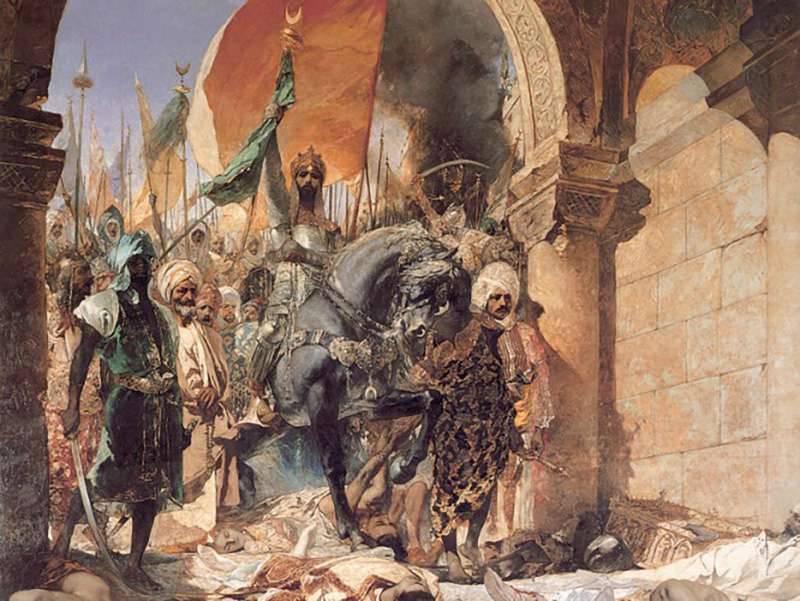
In the afternoon of May 29, Mehmed II drove solemnly into the downed city. After the allotted time, all the robberies were stopped, and the disobeyed orders were executed. It is believed that much less civilians died during the assault on Constantinople than during the seizure by French knights in 1204. A new civil administration was appointed from among the Greeks. Sultan also said that he would not interfere in the affairs of the Orthodox Church. Mehmed II officially took the title of Sultan and Lord of the Romans, clearly hinting at the continuity of the Roman Empire. The Byzantine Empire, which existed for a thousand years, ceased to exist. Instead of a tiny archaic state, a new powerful force appeared on the world stage, the Ottoman Empire, which forced the European rulers to shudder for more than one hundred years.
Information